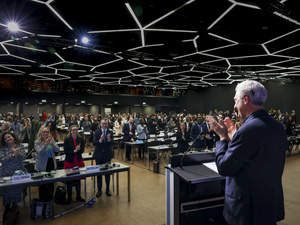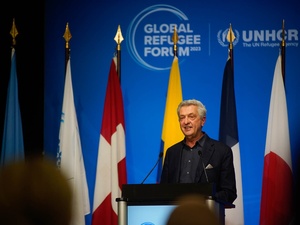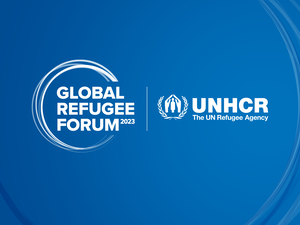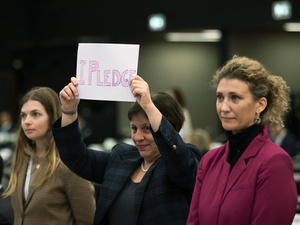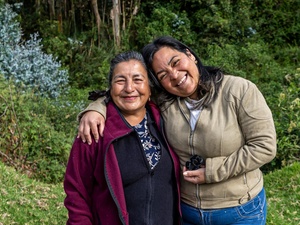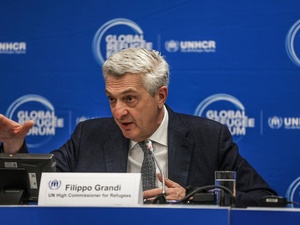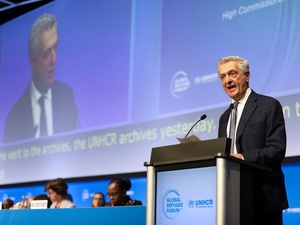New book explores past, present and future of protecting people forced to flee
New book explores past, present and future of protecting people forced to flee

Syrian Kurdish refugees cross the border from Syria into Turkey after fleeing fighting between Kurdish forces and IS around the city of Kobani in North East Syria.
UNHCR, the UN Refugee Agency, announces the publication of People Forced to Flee: History, Change and Challenge.
People Forced to Flee draws on the lessons of history to probe how we can improve responses to forced displacement.
Tracing the roots of asylum from early history to contemporary times, the book shows how the 1951 Convention relating to the Status of Refugees turned the centuries-old ideals of safety and solutions for refugees into global practice. It highlights the major achievements in protecting people forced to flee since then, while exploring serious setbacks along the way.
Published at a time when over 84 million people in the world are forcibly displaced, it examines international responses to forced displacement within borders as well as beyond them, and the principles of protection that apply to both: reviewing where they have been used with consistency and success, and where they have not. At times, the strength and resolve of the international community seems strong, yet solutions and meaningful solidarity are often elusive.
Most forced displacement is experienced in low- and middle-income countries and persists for generations. People forced to flee face barriers to improving their lives, contributing to the communities in which they live, and realising solutions. Responding better is not only a humanitarian necessity but a development imperative.
The book shows how this work gained momentum with the international affirmation in December 2018 of the Global Compact on Refugees; and it illustrates how it is being supported by a growing group of partners encompassing forcibly displaced people, local communities and authorities, national governments, international agencies, non-governmental organisations and the private sector.
People Forced to Flee also examines how increased development investments in education, health and economic inclusion are helping to improve socio-economic opportunities both for forcibly displaced people and their hosts. Alongside this are greater investments in data, evidence and analysis pointing to what works best. And it discusses the wide array of financing mechanisms that can support sustainable responses.

Book cover of 'People Forced to Flee. History, change and challenge', published by UNHCR.
As noted by Filippo Grandi, the UN High Commissioner for Refugees, in his foreword, the book highlights with great clarity the enormous challenges to preventing, mitigating, and finding solutions to forced displacement. “The drivers of displacement are unrelenting; the demands placed on humanitarian funding are growing,” Grandi notes.
Yet he adds that while “the challenges are enormous, history has repeatedly demonstrated the potential for, and power of, positive change”.
Published by Oxford University Press, People Forced to Flee is available in paperback and hardback or in digital format via this microsite.
Notes:
People Forced to Flee: History, Change and Challenge, takes up the mantle of a series of UNHCR publications, stretching back to 1993, that were previously entitled The State of the World’s Refugees.
This book was written by Ninette Kelley, who held a number of senior posts throughout her UNHCR career, including Representative in Lebanon. She has held various policy and consultative roles with international humanitarian agencies focusing on development, immigration and refugee issues, and in Canada served eight years on the Immigration and Refugee Board. She has published in the areas of human rights law, citizenship, refugee protection, gender-related persecution and the Canadian Charter of Rights and Freedom.
UNHCR received a large body of reference papers canvassing contemporary issues such as drivers of displacement; socioeconomic inclusion for forcibly displaced persons; improving data and evidence; unlocking more solutions; and engaging more broadly. These papers represent the perspectives of a broad array of partners in forced displacement responses and have helped inform the research for People Forced to Flee: History, Change and Challenge.
The reference papers reflect the personal views of the authors and do not necessarily reflect the position of their associated institutions or UNHCR. UNHCR is greatly appreciative of these contributions and insights, which can be accessed via the book’s dedicated microsite.
For more information on UNHCR, including news and stories, the latest data, reports, updates on emergency situations, and much more, please visit www.unhcr.org.
For images, video and documents relating to the 70th anniversary of the Convention and of the UN Refugee Agency, please access Refugees Media (free to register).
For more on the past 70 years of forced displacement around the world, listen to Forced To Flee, UNHCR’s podcast, available on desktop and all the major platforms.
For more information, please contact Barney Thompson ([email protected]) and Karolin Elisabeth Eberle ([email protected]).


